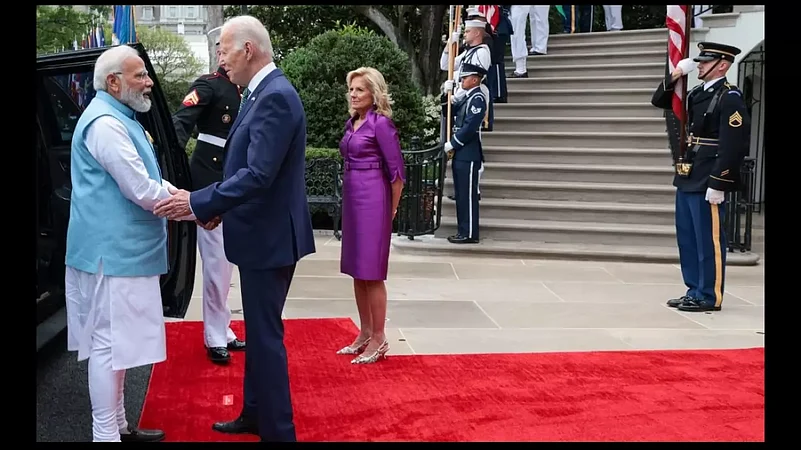In a leap of faith, the Biden administration is betting on India big-time. The US is opening up its high-tech sector to India and is now willing to share its state-of-the-art technology with joint production. From military jet engines to space collaboration, resilient supply chains, expanding business ties, and smoother visa facilities, nothing is off the table. A new $825 semi-conductor memory chip assembly and test facility will be set up by the US company Micron Technology, in Gujarat, Prime Minister Narendra Modi’s home state.
The 58-point joint statement released at the end of Thursday's official talks between Modi and Biden tried to capture the essence of the discussions. The two leaders "….. affirmed a vision of India and the United States as among the closest partners in the world – a partnership of democracies looking into the 21st century with hope, ambition, and confidence. The India-US Comprehensive Global and Strategic Partnership are anchored in a new level of trust and mutual understanding and enriched by the warm bonds of family and friendship that inextricably link our countries together… Our cooperation will serve the global good as we work through a range of multilateral and regional groupings – particularly the Quad – to contribute toward a free, open, inclusive, and resilient Indo-Pacific. No corner of human enterprise is untouched by the partnership between our two great countries, which spans the seas to the stars.’’
Though the details of the agreements signed during the visit are not known, they are significant and will accelerate India’s defence and economic growth. Some of the big-ticket items were talked about ahead of Prime Minister Narendra Modi’s visit to the US. American officials had spoken openly but India was more cautious, preferring not to comment on deals that were on the table and not yet signed. That it all came together during the Prime Minister’s first state visit, is an added bonus for the ruling party with elections slated for next year.
Much of the newfound bonhomie has to do with the evolving world situation – the Ukraine war, China's rise, and the breakdown of supply chains during the pandemic. The wooing of India is partly Washington’s attempt to break New Delhi’s close defence ties with Russia as well as to close the yawning gap between India and China’s military capabilities. The US hopes to promote India - the world’s most populous country - as a bulwark against China’s growing political and military clout in Asia. America regards China as a potential challenger to its Superpower status in the near future. And a democratic India, despite the slide in liberal values here, is America’s bet against authoritarian China. Even as Biden sent out his Secretary of State Antony Blinken to China to repair ties with his main rival, he dubbed President Xi Jinping a "dictator" undoing much of the good work done by Blinken. Beijing was naturally livid and said this was "open political provocation".
A significant defence deal for the co-production of the jet engine was inked on the sidelines of the PM’s visit. Hindustan Aeronautics signed an agreement with America’s General Electric on Thursday to jointly manufacture jet engines for the Indian military. This is a big deal because not many countries have the technology to do so. It is also in line with Modi’s insistence on a self-reliant, Atmanirbhar Bharat. The $30 billion deal for the purchase of 31 MQ9B Predator drones will also be part of the new defence package. Block by block the US is building a major defence-industrial pact with India.
The Biden administration has bent over backwards to power India’s growth to the big league; does this mean a break with the past for New Delhi? Will expanding defence ties and all-around development of relations in every sphere bring India into the US camp? Not so soon, as India is unlikely to jettison its relations with Russia, a steadfast traditional ally. India is not in a defence agreement with the US, like Japan or Australia, countries that go along with America. India believes in a multi-polar world and co-operates with any country that serves its interests, notwithstanding what the US wants. New Delhi is unlikely to sacrifice its strategic autonomy to any country.
Yes, Ukraine was brought into the joint statement: "Prime Minister Modi and President Biden expressed their deep concern over the conflict in Ukraine and mourned its terrible and tragic humanitarian consequences. The leaders underscored the serious and growing impacts of the war on the global economic system, including on food, fuel, and energy security, and critical supply chains. They called for greater efforts to mitigate the consequences of the war, especially in the developing world. Both countries further pledge to render continuing humanitarian assistance to the people of Ukraine. They called for respect for international law, principles of the UN charter, and territorial integrity and sovereignty.’’
Without mentioning Russia, territorial integrity and sovereignty were brought in. However, till President Putin is on the scene, India is unlikely to take the final step.



























